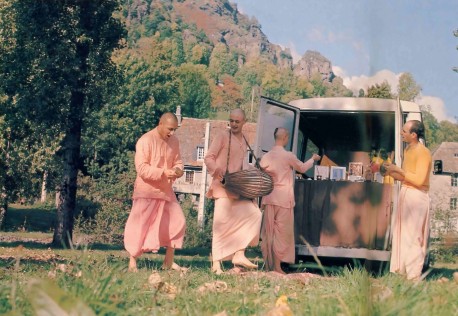
A Report from France
Now that they’ve seen everything from bad priests to bogey yogis, the French are more than a little embittered. But when they see people living the authentic life of devotion to God, they feel enlivened.
Text by Yogesvara dasa
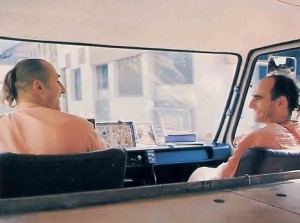 By 6:00 P.M. on a chilly September day, rural France has already slipped into darkness. Passing swiftly through villages and towns in our Citroen van, we look out at row upon row of churches silhouetted against the moonlit evening sky—flimsy bastions against the forces of evil. We ride quickly down cobblestone streets, past small shops where old ladies in long black dresses weave precious dentelles for altars and parlors. The typical smell of French bread and cheese pervades the air.
By 6:00 P.M. on a chilly September day, rural France has already slipped into darkness. Passing swiftly through villages and towns in our Citroen van, we look out at row upon row of churches silhouetted against the moonlit evening sky—flimsy bastions against the forces of evil. We ride quickly down cobblestone streets, past small shops where old ladies in long black dresses weave precious dentelles for altars and parlors. The typical smell of French bread and cheese pervades the air.
For a few weeks I have put aside my work of translating Krishna-conscious books into French and joined the devotees in the field for book distribution. It has been three years since I went on traveling sankirtana, but I seem to be making the adjustment well. We are five in the van and the hardy mood of spiritual pioneering predominates. There is a distinct sense of mission, devoid of false prestige. Sri Caitanya Mahaprabhu, the munificent incarnation of Lord Krishna who appeared in Bengal, India, five hundred years ago, once predicted, “In every town and village My name will be chanted.” Now, as we travel to the remotest corners of France to distribute the books of His Divine Grace A.C. Bhaktivedanta Swami Prabhupada, I am seeing the fulfillment of that prophecy.
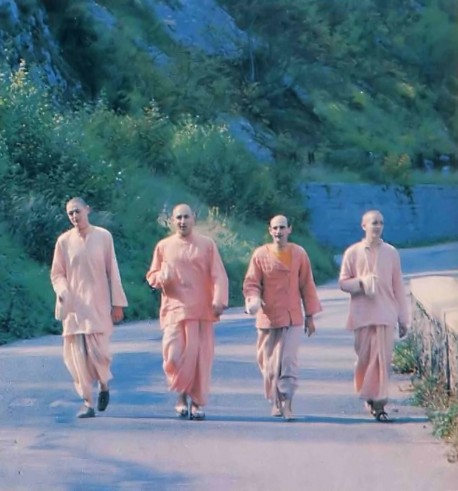
The other devotees in our party (Pitavasa, Jagadvasi, Sahasramurdhan, and Prasannatma) are enthusiastic to interest the French people in the life of Krishna consciousness. And the French are a receptive audience. Every month more than forty thousand French BACK TO GODHEADS circulate in France and French-speaking Switzerland. The French edition of the Bhagavad-gita As It Is (La Bhagavad-gita Telle Qu’Elle Est) has already sold out two printings of twenty-five thousand copies in one year. In addition, despite recent controversy over the tactics and political ambitions of certain pseudoreligious sects in France, the Krishna consciousness movement has emerged with a unique reputation for integrity and authenticity.
On the road, our party’s daily routine is rigorous. Up at 4:00 A.M., we are more often than not parked in an open field, by a running stream if possible. We shower from jerry cans of fresh water, dress by candlelight. The resilience of sankirtana devotees comes from a combination of youthful exuberance and a strong faith in the potency of Caitanya Mahaprabhu’s mission. Simply by giving out books and magazines on the science of bhakti-yoga, the devotees are helping people all over the world lend spiritual strength to their lives. Unlike communism, which is also popular among French youth, Caitanya Mahaprabhu’s movement accomplishes with a few regulative principles and the chanting of the holy names what no political or social revolution could do: it cleanses the heart of lust, anger, and greed, and plants the seed of love of God.
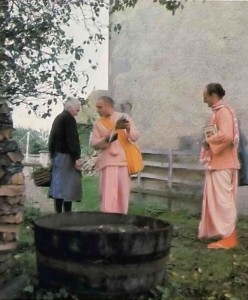
Often the devotees speak with priests in charge of particularly historic cathedrals, but these structures are mere vestiges of a Church once awesome in its political power and wealth. Today the youth of France are openly hostile to religion or anything reminiscent of Divine Right, because Church leaders have failed both to present God consciousness on a platform of intelligent dialogue and to practice what they preach. Thus, spiritualism in contemporary France has atrophied for lack of substance. The pages of Marxist-Leninist publications (“Bibles” for a large section of French youth) are best read between the lines. They reveal a bitterness toward Christian dogma and the threat of damnation, and a defiant affirmation of man’s absolute independence, without need of any God to help him. This hubris finds its expression in popular French songs, such as “Ni Dieu Ni Maitre” (“No God, No Master”).
On the other hand, the majority of French people, both young and old, have had a Catholic training early in life. There are relatively few political activists outside hot spots like Paris and Marseilles, and despite the prominence of communist sentiment (the President defeated his communist-supported opponent by less than one percentage point in the last national election), interest in Krishna consciousness is strong. Two years ago over twenty-five hundred people turned out to hear Srila Prabhupada lecture at the Salle Pleyel in Paris; every Sunday 150 to 200 guests attend the festival at the Paris temple; and every week hundreds of letters stream into our New Mayapur farm in central France, requesting information, books, and membership.
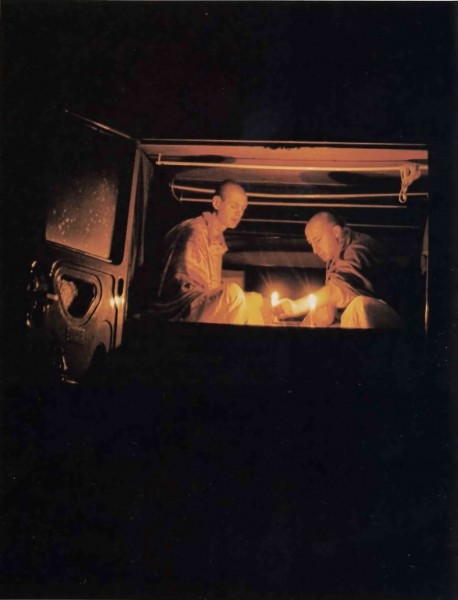
So, with full faith in the impact our preaching is having in France, we are now traveling from town to town and introducing hundreds of people to Krishna consciousness each day. A typical encounter might go like this:
“Bonjour, we are from the Krishna movement. We have an album of traditional Indian songs [recorded by the Paris temple music group, “Vrindavan”] and books on the philosophy of Vedic culture. People make donations for our publications, and the money goes to maintain our programs in France. We have a farm near Valencay and a school for children.”
After some discussion people often ask, “Do you work?”
“Oh yes, not only do we work the land on our farm, but many of us work outside the community as well. The President of our association, Monsieur Dilhaire, is a professional architect. In addition, apart from our own studies, we have lecture programs at the high schools and universities, a publications bureau that produces French translations of ancient Sanskrit texts…”
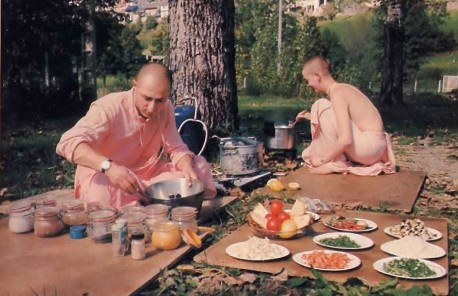
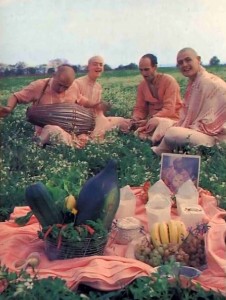 On rare occasions, someone in a shop or office will ask, “What is your philosophy?” This is an opportunity for us to explain how the living being is not the material body but an eternal spirit soul, how each spirit soul is part and parcel of God, how Krishna is the name of God given in the Vedic scriptures, how He is the cause of all causes, and how He can be known by serving Him with devotion under the guidance of a bona fide spiritual master.
On rare occasions, someone in a shop or office will ask, “What is your philosophy?” This is an opportunity for us to explain how the living being is not the material body but an eternal spirit soul, how each spirit soul is part and parcel of God, how Krishna is the name of God given in the Vedic scriptures, how He is the cause of all causes, and how He can be known by serving Him with devotion under the guidance of a bona fide spiritual master.
As we talk with people, two topics appear foremost in their minds: the failing economy and the incompetence of organized religion to offer any viable solutions. Having so often had their confidence betrayed and their hopes for miracles shattered, people have become disillusioned with religion or anything related to it. In addition, outsiders masquerading as spiritual mentors have encouraged cynicism by creating an aura of politics and money around the search for truth. And rumors of nefarious tactics (“mind control,” “brainwashing”) have simply added fuel to the fire. Still, people are anxious to voice their concern to us.

Regarding the miserable economy, one merchant in the Massif Central remarks, “What’s happening today reminds me exactly of the conditions preceding World War II. Things are going down so fast, I expect a revolution of some kind.”
“So what to do?” I ask.
“I thought you were the ones with all the answers. Maybe one day I’ll join your movement. One never knows. What do I have to do—shave my head?”
The combination of his friendly derision and frank helplessness strikes me as ironic, and many others echo his sentiments. Here are people who have seen Nazi occupation. They have known fanaticism. So naturally they are extremely cautious when approached by someone presenting an unfamiliar philosophy. Nonetheless, their desire to know an alternative to the present difficult conditions is unmistakably real. Thus, despite their reluctance and doubts, these people of rural France commonly establish a unique rapport with the devotees, as if the devotees were gradually replacing the village chaplains in their role of confidante and spiritual advisor. But suddenly the “chaplain” is no longer an agent of ecclesiastical manipulation (“Mr. Dupuy, we didn’t see you in Mass last Sunday”), but a student of spiritual science, qualified to answer questions on practical spiritual life.
“No, you don’t have to shave your head,” I reply. “You can keep your usual dress. The only necessity is to read the Bhagavad-gita regularly, offer your food in devotion to Lord Krishna, and not do anything to hinder your spiritual progress. We are having a conference next month at the Saint Etienne Cultural Center. Why don’t you come? We’re going to show slides of our farm community and discuss programs for this part of the country.”
“Perhaps,” replies the merchant, “if I have the time. Not much time for anything these days. Business is so bad. But you’re very nice. Here’s a donation for your farm, and sure, I’ll read your magazine.”
As I leave his shop, I can see several people in the street with Bhagavad-gitas under their arms. (They obviously have met my Godbrothers down the street.) By the end of the week, people are stopping us to ask for another book or record for a friend or relative.
Pitavasa remarks later in the van, “They’re really interested. In one shop I met the head librarian and showed her the Srimad-Bhagavatam. She said, ‘Oh, un autre petit bijou! [Oh, another little gem!]’ and gave me seventy francs. She has all the other French editions of Srila Prabhupada’s books, from the time devotees were here last year.”

Jagadvasi recalls an evening we spent with some interested people from Firminy. “There were about a dozen people. They had heard about the meeting from the lady who owns the health food shop. So when we arrived, cars were parked all up and down the road. We prepared a feast of pakoras, samosas, subji, lassi, and sweet rice and offered it to Krishna with kirtana, and we talked with everyone during the feast. They appreciated that we offered our food to God. They were already interested in yoga, so they had a lot of questions about different spiritual masters, exercises, and so on.”
“What do you tell people,” asks Sahasramurdhan, “when they want to know our opinion of such-and-such swami or guru?”
“I cite those verses from the Bhagavad-gita:
imam vivasvate yoga
proktavan aham avyayam
vivasvan manave praha
manur iksvakave ‘bravit
evam parampara-praptam
A real spiritual master is coming in disciplic succession from the Lord, therefore, whatever he presents is authentic spiritual knowledge. And it can be verified by reference to scripture. Also, he must practice the teachings of scripture in his own life.”
“But they always say, ‘Yes, so-and-so was the disciple of so-and-so, and he was always in trance.’ “
“Then I would explain that you must judge a guru by the results of his teachings. If his teachings are authentic, then his followers will develop love of God. And the proof will be that they obey the orders of God, such as ‘Thou shalt not kill.’ And there are other indications of a true spiritual master given in the scriptures. One is that he never claims to be God, but rather the humble servant of God, and he petitions people to become God’s devotees.”
“But then they argue…”
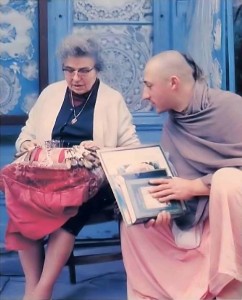
“If they are looking to argue, then what can you do?” interjects Sahasramurdhan. “If they are sincerely interested, they will be sensitive to what is real and what is bogus. But if they are just trying to haggle with us, how do you expect them to understand? The best reply I have heard was the one Srila Prabhupada gave the Theosophists who came to see him in Geneva. He said that only one who is in knowledge of Krishna can speak about Krishna. If people want to know about something else, they can go elsewhere. That is their own concern. But in our movement we speak of Krishna on the basis of Bhagavad-gita As It Is and the predecessor acaryas [spiritual masters]. If someone wants to know about Krishna, he can come to us.’ “
Everyone agrees that Srila Prabhupada’s approach would be better than trying to argue the pros and cons of various other practices and teachers.
The discussion returns to the sankirtana program and its great success in France. “Sometimes,” says Prasannatma, “I have to walk for half an hour in these small towns before coming to a house. But then someone will open the door and say, ‘Oh, I have been hoping you would pass by this way. Do you have the Bhagavad-gita?’ It’s incredible, but many people greet us as if they’d been waiting patiently at the door.”
Jagadvasi responds, “That’s happened to me, too. Even in the poorest sections of town, people show such real interest.”
“That proves real religion is not something dependent on economic or political factors,” remarks Prasannatma. “The old lady in the pastry shop or the big boss from the local textile factory—you meet people in all kinds of social conditions, people frustrated by materialistic life and looking for spiritual knowledge. Their questions are often very elevated, about the nature of the soul or the purpose of yoga…”
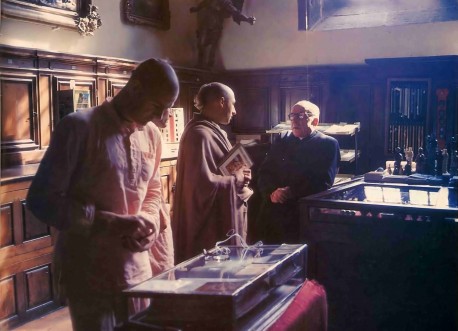
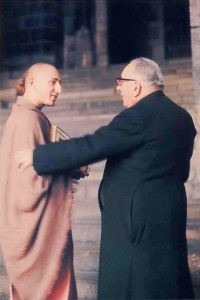 This is an important point. George Hegel, the German historian (much read in France), hypothesized that religion was a by-product of social necessity. He saw the function of religion as being what French youth call “white communism,” the class struggle hidden behind a mask of self-righteousness and piety. The brahmanas of Vedic times, said Hegel, were like today’s bourgeoisie, feeding off the labor of the lower classes, the proletariat. Thus, according to Hegel, the ultimate issue in human society—that of the haves versus the have-nots, the exploiters versus the exploited—was found even in the Vedic culture.
This is an important point. George Hegel, the German historian (much read in France), hypothesized that religion was a by-product of social necessity. He saw the function of religion as being what French youth call “white communism,” the class struggle hidden behind a mask of self-righteousness and piety. The brahmanas of Vedic times, said Hegel, were like today’s bourgeoisie, feeding off the labor of the lower classes, the proletariat. Thus, according to Hegel, the ultimate issue in human society—that of the haves versus the have-nots, the exploiters versus the exploited—was found even in the Vedic culture.
There are numerous fallacies in Hegel’s arguments, but the most outstanding is simply that he has taken the India of recent history, a country twisted by colonialism and the influences of Western materialism, and drawn general conclusions about the intrinsic value of a God-conscious culture. The Krishna conscious sankirtana devotees, however, are living proof of a contrary conclusion. Their example of active devotion to God, decorated with the rare qualities of austerity, compassion, cleanliness, and honesty, disproves the theory that Krishna consciousness is another brand of religious hypocrisy. The devotees are offering the greatest service to mankind by distributing God consciousness and introducing practical programs for the spiritual upliftment of society. In exchange for publications on the science of Krishna consciousness, they ask people to make some contribution. This should not be seen as charity, but rather as an insignificant price to pay for the most invaluable knowledge.
After several weeks of distributing books with the sankirtana party, I have now returned to the New Mayapur farm. I see many new faces, and the farm is buzzing with activity: publishing work at the press, teaching at the Gurukula (the children’s school), construction of houses and beehives, planting and harvesting, classes and kirtanas. It is at moments like these that I feel closest to Srila Prabhupada, seeing how, by his mercy, people everywhere are becoming happy in Krishna consciousness.

Leave a Reply